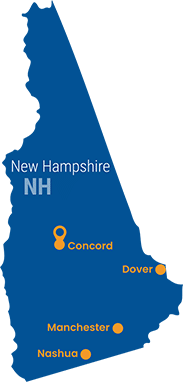University Headquarters (HQ) is an industry-leading, independent educational organization that provides independent college rankings using a proprietary formula to create first class, unbiased rankings. The team at University HQ strives to provide accurate and trustworthy rankings that highlight the best programs in New Hampshire.
Featured Online Programs
New Hampshire has almost 760,000 people employed in the workforce, outside of those who work for the government. Employment has been on the rise in the state recently and the unemployment rate has remained relatively low with a current rate of 2.5%. Most industries have reported an increase in employment, with business and finance, manufacturing and construction seeing the largest increases. The median income for an individual in New Hampshire is $35,807, while New Hampshire families make on average $76,678 annually.
The top paying industries are Business/Finance, Manufacturing, Education, and Construction. However, their economy includes industries that cover a broad spectrum and students who are considering their college choices will have plenty of options to choose from.

Online Higher Education in New Hampshire
- How much is college tuition in New Hampshire?
For the 2020-2021 academic year, tuition for in-state New Hampshire students was around $10,100. Out-of-state students were charged closer to $20,900 for tuition. Graduate students paid $16,650 for in-state tuition, and out-of-state students paid $21,500. For students who opted to live on campus, the cost for room and board for all students was $11,950.
Unsurprisingly, the college with the highest undergraduate tuition in the state is Dartmouth College, with costs sitting at around $60,850, and the least expensive college tuition was at Granite State College with a cost of $9,000. For graduate school, Dartmouth College again had the highest tuition at $59,283 and Colby-Sawyer College has the lowest at $7,320.
Find Your Online New Hampshire Program
- How many students are enrolled at colleges and universities in New Hampshire?
As of the 2020-2021 academic school year, there were 189,349 students enrolled in New Hampshire colleges and universities. Undergraduate students were the majority, with 155,282 enrolled in undergraduate programs and the remaining 34,067 students attending graduate school. And the number of students enrolled part-time is greater than those attending full-time, 106,491 to 82,858. - How many students attend online classes?
For the 2020-2021 academic year, 143,770 students attended classes exclusively online, and another 25,745 took at least one online course during their education. - What are some of the most popular degrees to get online?
Some of the more popular programs include Business, Education, Finance, and Healthcare.
Our School Rankings Methodology
We use a particular set of criterions when creating our rankings. Some of the factors we consider include the following.
- Admission Rate:
This number shows how competitive a school actually is. High admission rates mean it’s easier to be accepted, while a lower rate means the school is more selective of its students. Community colleges are often easier to get into than four-year colleges but even they can have a strict criteria for admission. - Graduation Rate:
We check the length of time students need to complete programs and whether that timeframe is within the standard four to six years for an undergraduate degree. Most students complete their degree programs in 4-5 years but needing six or more years to finish is not out of the ordinary, especially for part-time students. - Net Price:
This is the total amount a student will have to pay out of pocket for their education. This amount is the balance of tuition and fees after grants, scholarships, and work study credits have been applied. - Online Availability:
Whether courses and programs can be completed online either partially or completely is considered because it can provide flexibility and access to a wider range of students. - Retention Rate:
We evaluate how many students return after their first year of classes, which is the retention rate. This can help students to gain some insight into whether or not most freshmen find that the college provides them with everything they need to succeed. - Student-to-Faculty Ratio:
The smaller the ratio, the smaller the classes and the greater chance for instructor interaction. Some students prefer smaller classes, while other students prefer larger ones, and the student-to-faculty ratio indicates which is the case.
Best Online Associate & Community Colleges in New Hampshire
Nashua Community College
Score: 86.9
- Undergraduate Tuition
- In-State: $7,140
- Out-of-State:$15,390
- Net Price: $13,561
- Acceptance Rate: 100%
- Retention Rate: 61%
- Graduation Rate: 30%
- Total Enrollment: 1,262
- Undergrad Students: 1,262
- Graduate Students: N/A
- Grads Salary: $34,800
- Student-to-faculty: 8:1
Manchester Community College-New Hampshire
Score: 83.87
- Undergraduate Tuition
- In-State: $7,090
- Out-of-State:$15,340
- Net Price: $14,458
- Acceptance Rate: 100%
- Retention Rate: 67%
- Graduation Rate: 37%
- Total Enrollment: 2,012
- Undergrad Students: 2,012
- Graduate Students: N/A
- Grads Salary: $36,300
- Student-to-faculty: 11:1
NHTI-Concord's Community College
Score: 74.9
- Undergraduate Tuition
- In-State: $7,200
- Out-of-State:$15,450
- Net Price: $16,221
- Acceptance Rate: 100%
- Retention Rate: 60%
- Graduation Rate: 31%
- Total Enrollment: 2,613
- Undergrad Students: 2,613
- Graduate Students: N/A
- Grads Salary: $42,800
- Student-to-faculty: 11:1
Top 5 Best Online Colleges in New Hampshire
University of New Hampshire
Score: 81.6
- Undergraduate Tuition
- In-State: $19,112
- Out-of-State:$38,882
- Net Price: $24,762
- Acceptance Rate: 87%
- Retention Rate: 86%
- Graduation Rate: 76%
- Total Enrollment: 13,626
- Undergrad Students: 11,376
- Graduate Students: 2,250
- Grads Salary: $77,000
- Student-to-faculty: 16:1
Rivier University
Score: 80.29
- Undergraduate Tuition
- In-State: $37,791
- Out-of-State:$37,791
- Net Price: $28,227
- Acceptance Rate: 82%
- Retention Rate: 76%
- Graduation Rate: 59%
- Total Enrollment: 2,879
- Undergrad Students: 1,335
- Graduate Students: 1,544
- Grads Salary: $90,000
- Student-to-faculty: 14:1
Colby-Sawyer College
Score: 75.63
- Undergraduate Tuition
- In-State: $18,400
- Out-of-State:$18,400
- Net Price: $26,483
- Acceptance Rate: 90%
- Retention Rate: 81%
- Graduation Rate: 62%
- Total Enrollment: 950
- Undergrad Students: 834
- Graduate Students: 116
- Grads Salary: $75,000
- Student-to-faculty: 10:1
Keene State College
Score: 72.82
- Undergraduate Tuition
- In-State: $14,710
- Out-of-State:$26,186
- Net Price: $20,405
- Acceptance Rate: 89%
- Retention Rate: 78%
- Graduation Rate: 58%
- Total Enrollment: 2,846
- Undergrad Students: 2,718
- Graduate Students: 128
- Grads Salary: $67,000
- Student-to-faculty: 16:1
Plymouth State University
Score: 69.61
- Undergraduate Tuition
- In-State: $14,558
- Out-of-State:$25,498
- Net Price: $20,280
- Acceptance Rate: 91%
- Retention Rate: 71%
- Graduation Rate: 47%
- Total Enrollment: 3,839
- Undergrad Students: 3,336
- Graduate Students: 503
- Grads Salary: $70,000
- Student-to-faculty: 15:1
Search All Programs










